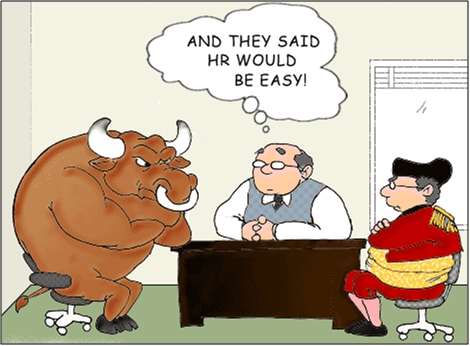Jokes on HR are very popular among employees. Stereotypes, sarcasm and perceptions are the biggest barriers between HR and employees. HR now has to look beyond.
Disha, Sameer, Prerna and Yogesh, the HR team of Troy Securities, walks in for a late lunch at the cafeteria. It was a crazy day for the team. While Disha was caught up in a recruitment drive, Sameer had to prepare the payroll input, Prerna had to rush to the hospital for an employee’s emergency mediclaim case and Yogesh had to urgently deal with a union going rogue.
A group of employees, sipping tea in the cafeteria, sneeringly comment, “Look at these HR guys—they have no work. They enjoy the most chilled out lives. I wonder what they are paid for.”
Being subject to sarcasm is part of every HR professional’s life.
The human resources department is often the primary target of archaic stereotypes formed over a period of time. Ranging from incorrect perceptions to HR jokes, these stereotypes form barriers between employees and HR managers to truly connect and understand each other.

“It has entered the psyche of people. HR is going beyond the defined realms to bring out the true potential of the employees, be it capability building or employee championship. Yet, employees are unable to appreciate all this because these historical perceptions keep coming back,” says Jayant Kumar, chief human resources officer, Tata Power.
SOME OF THESE STEREOTYPES ARE:
HR is just a support functionHR is often considered a cost centre. It is perceived as just a facilitator of employee services, rather than a strategic entity the business cannot function without. Organisations today are challenging this status quo and adopting various means to utilise HR to its full potential. One such manoeuvre is David Ulrich’s ‘three-legged model’. Applicable majorly on large organisations, it is based on three key elements—HR business partners, shared HR services and HR centres of excellence. The philosophy is to self-serve, reduce day-to-day transactions, strategically contribute to the organisation’s goals and become result-oriented drivers. “Traditional HR is over. HR managers now have to strategise from a business perspective rather than an HR perspective. They have to act like they own the business,” says Pradnya Kulkarni, director, technology change management, UBS.
HR has no work and is inefficientPeople often lack knowledge about the roles and responsibilities of HR and presume it to be non-agile. A major cause of these perceptions is HR’s nature of job, and practice of keeping things confidential. A study by totaljobs.com indicates that an average of 21.8 per cent of an HR manager’s time is spent on meeting with senior management and business partners, while 28.9 per cent is spent interacting with employees. Employees only see the end outcome of most HR functions, not the multiple complex processes incurred at the backend to reach that outcome.

It has entered the psyche of people. HR is going beyond the defined realms to bring out the true potential of the employees, be it capability building or employee championship. Yet, employees are unable to appreciate all this because these historical perceptions keep coming back.
Jayant Kumar, chief human resources officer, Tata Power
HR is diplomatic and cannot be trusted

HR’s role is complex and conflicting in nature. They have to execute vicious tasks—terminate non-performing employees, normalise performance ratings, counsel misbehaving employees, reject unsuitable candidates, and so on. Such tasks often require HR to be tactful and diplomatic. They have to be assertive yet sensitive towards the other person’s feelings, ideas and opinions. These incidents spread like wild fire, earning HR a bad repute. However, people fail to understand that HR managers are eventually human beings and suffer from internal turmoil and torment, while performing such tasks. “Such stereotypes exist and they will continue to exist because HR is all about dealing with human beings. They have emotions and strong opinions about everything, especially the ones that don’t work in their favour,” says Kumar.
HR stereotypes are similar to superstitions — ancient, baseless and unrealistic. With the dawn of awareness and technology, stereotypes revolving around HR are undergoing a change. However, they need to be completely wiped out with rationale and opportunity; only then we can unleash the true potential of HR.



